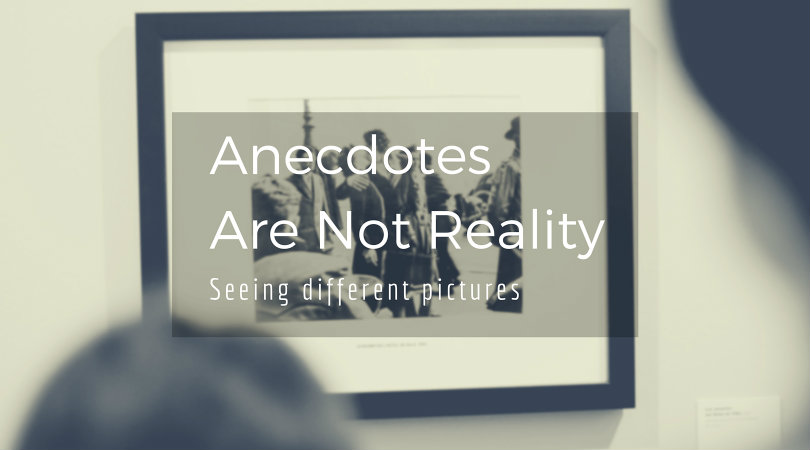We love anecdotes. They say profound things about our lives and how they are lived. And we are full of them. Just ask someone about politics or religion and see what you get.
In my world, so many use anecdotes to speak for where the church needs to go in the future. This has led rise to a whole host of Millennials speaking for what Millennials want from church. All different. Some saying tradition will save the church. Others postmodernism will save the church. Both are sort of true. Neither is the whole truth.
[bctt tweet=”‘Anecdotes are not an entirely honest response to statistical evidence.’” nofollow=”yes”]
You like to use anecdotes, right? So I have to ask.
You do know that when people speak about problems, they aren’t implying they are universal, don’t you? And if your response is to give anecdotal evidence that not everybody does something, can you also recognize that no one is actually saying everyone? That nothing is that black and white?
This happens to me all the time (see what I’m doing here?). I say something and people twist it to say something else.
When someone says racism is a cancer on a system they are not saying every police officer is a racist.
When someone says we have a gun violence problem they are not saying there are no responsible gun owners.
When someone says that not going to college makes one more likely to end up incarcerated they are not saying you totally will.
Anecdotes are not an entirely honest response to statistical evidence. Its trading in the big picture for the small one without admitting to it. A small one that conforms to our personal experience. But your experience doesn’t make the big picture any less true.
Some of us are moved by the statistics. Others stories. That is totally a thing.
For those moved by the stories, can you at least recognize that for many of us, the statistics do actually tell us a story? A story of opportunity and hope. A story of potential, of making a difference. Of seeing a world with less racism and fewer crooked cops. Of seeing a world in which the U.S. has fewer *proportional* gun deaths than England, France, and Hungary (we’ll take most of Africa, too!). Of seeing a world in which more people have more access to meaningful work which pays them well and allows all of us to live out the American Dream, not just those who possess certain advantages.
For those moved by statistics, can you at least recognize that for many of us, our story doesn’t match the total story? A story of tradition and expectation. A story of regional identity and family lineage. Of seeing a world in which the U.S. supports and protects those who serve and protect us. Of seeing a world in which people are able to teach and respect one another so much that our liberties are not questioned. Of seeing a world in which people do physical work or stretch themselves or don’t have fancy titles and are not belittled for their lack of education or their regional dialects.
Can we listen to each other? When we talk about big picture things, can we recognize that there are local stories that may be different? When we talk about small picture things, can we recognize that there are hundreds of millions of people with a completely different experience from ours? Can we recognize that speaking to our common reality is never identical to our personal one?
Can we please have some honest conversation about our stuff? Chances are really good the person didn’t actually say what you think they said. You were looking at the wrong picture.


Leave a Reply